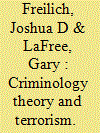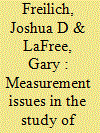|
|
|
Sort Order |
|
|
|
Items / Page
|
|
|
|
|
|
|
| Srl | Item |
| 1 |
ID:
144895


|
|
|
|
|
| Summary/Abstract |
This study article focuses on American far-right (FR) extremists who committed ideologically motivated violent or financial crimes in the United States. We examine three research questions. First, are certain types of FR ideological beliefs associated with different types of criminal behavior? Second, can the various indicators of FR ideology be used to create a scalar measure of commitment to FR ideology? Third, which typology of the FR movement provides the most reliable measure of FR extremism? We use data from the United States Extremist Crime Database to measure indicators of FR ideology in a sample of 305 FRs who committed a financial crime or homicide between 2006 and 2010 in the United States. Conspiratorial, antigovernment, and antitax beliefs were positively associated with risk of financial crimes, while xenophobic, survivalist, and anti–gun control beliefs were positively associated with risk of violent crimes. A factor analysis created a commitment to FR ideology scale and identified four sub-types of FRs: Conspiracy Theorist, Survivalist, Movement Participant, and Proud far-rightist. The factor analysis did not support the prevailing typologies. Importantly though, these typologies were useful in predicting criminal behavior patterns of far rightists. We outline a number of other measurement issues for future research to address.
|
|
|
|
|
|
|
|
|
|
|
|
|
|
|
|
| 2 |
ID:
138772


|
|
|
|
|
| Summary/Abstract |
In this short essay, we introduce readers to a special issue of Terrorism and Political Violence on criminological approaches to the study of terrorism. In addition to summarizing the eight articles in the issue, we outline some general points about the relationship between criminological thinking and our understanding of terrorism. Our goal is to place the special issue's contributions in context and highlight under-explored issues that future research could address.
|
|
|
|
|
|
|
|
|
|
|
|
|
|
|
|
| 3 |
ID:
124537


|
|
|
|
|
| Publication |
2013.
|
| Summary/Abstract |
Little is known about the nature of far-right lone wolf terrorism and how this form of violence varies across different types of suspects. Relying on data from the Extremist Crime Database (ECDB), we comparatively examine characteristics of far-right homicides in the United States perpetrated by suspects with no evident affiliations with domestic terrorist organizations. Surprisingly, we found that this form of lone wolf terrorism has generally not increased during the past decade. We also found important differences, such as in suspects' mental health, in statuses of homicide offenders who operate alone compared to those who associate or act with others.
|
|
|
|
|
|
|
|
|
|
|
|
|
|
|
|
| 4 |
ID:
132305


|
|
|
|
|
| Publication |
2014.
|
| Summary/Abstract |
This note describes a new and unique, open source, relational database called the United States Extremist Crime Database (ECDB). We first explain how the ECDB was created and outline its distinguishing features in terms of inclusion criteria and assessment of ideological commitment. Second, the article discusses issues related to the evaluation of the ECDB, such as reliability and selectivity. Third, descriptive results are provided to illustrate the contributions that the ECDB can make to research on terrorism and criminology.
|
|
|
|
|
|
|
|
|
|
|
|
|
|
|
|
| 5 |
ID:
144889


|
|
|
|
|
| Summary/Abstract |
In this article, we introduce readers to a special issue of Studies in Conflict & Terrorism on measurement issues in the study of terrorism. In recent years scholarly interest in terrorism has increased and systematic methods are now more commonly used. Terrorism works that analyze data highlight substantive findings as opposed to measurement issues. A study's substantive findings are only meaningful though if it correctly addresses the measurement issues that invariably arise during the research process. In addition to summarizing the eight articles in this special issue, we outline the strengths and weaknesses of various measurement strategies and assess their contributions to our understanding of terrorism. The major goal is to place the special issue's contributions in context and highlight under-explored issues that future research could address.
|
|
|
|
|
|
|
|
|
|
|
|
|
|
|
|
| 6 |
ID:
138780


|
|
|
|
|
| Summary/Abstract |
This study examines whether Criminology's Routine Activities Theory (RAT) and related Lifestyle Theory (LST) can account for variation between the attributes of victims of fatal ideologically motivated attacks (akin to terrorism) and the victims of non-ideologically motivated homicide incidents committed by far-Right extremists in the United States. This article makes four contributions. First, we empirically test Criminology theory in the context of terrorism by using routine activities to devise four core hypotheses to explain differences between the two types of victims. Second, our investigation uniquely includes a non-terrorist comparison group (i.e., victims of homicides committed by extremists for personal reasons like greed). Third, our study focuses on ideological victimization. Terrorism researchers have usually ignored victims because of the difficulty in accessing the necessary data. Finally, we also make a methodological contribution by showing that criminology can build upon the terrorism literature by utilizing open-sources. Using data from the Extremist Crime Database (ECDB), the results of a multivariate analysis partially supported the hypotheses, showing that RAT and LST offer empirically supported theoretical constructs that have the ability to differentiate between ideological and non-ideological homicides.
|
|
|
|
|
|
|
|
|
|
|
|
|
|
|
|
| 7 |
ID:
099825


|
|
|
|
|
| Publication |
2010.
|
| Summary/Abstract |
This study presents state police agencies' perceptions about three significant terrorism issues on which there is little empirical research. All three issues have significant implications for understanding the role of state police agencies in responding to terrorism threats. First, the authors investigated whether the respondents believed that supporters of specified extremist movements tended to commit crimes as lone wolves, with others, or both alone and with others. Second, they were asked to provide data to gauge how often far-right extremists committed 13 crime types that varied in magnitude and motivation. Third, they were asked if they had knowledge about whether far-right extremists and Islamic jihadists had cooperated to commit crimes. These data were collected by surveying the 50 state police agencies in the United States. The results indicate that state police officials are concerned with both group and lone-wolf activities. Importantly, there was variation in the potential for lone-wolf crimes when comparing different types of extremist movements. The results indicate that far-right extremists are involved in a range of terrorist, preparatory, and routine criminal activities, but this involvement varies by region. Two state police agencies also indicated that they knew of Islamic and far-right collaboration. The study identified two other instances of direct collaboration and a number of other interesting cases through open source searches. The article concludes with a discussion of the policy implications of the findings and outlines directions for future research.
|
|
|
|
|
|
|
|
|
|
|
|
|
|
|
|
| 8 |
ID:
089989


|
|
|
|
|
| Publication |
2009.
|
| Summary/Abstract |
This study presents American state police agencies' perceptions about three significant terrorism and public safety issues. First, we asked about the threat posed by specified extremist groups nationally and to their state. We asked about the number of such groups and their supporters, and the number of activities each group participates in during a typical year in their state. We also asked about the number of criminal incidents each group commits and the number of their supporters arrested in a typical year. Second, we asked the agencies to rate the usefulness of fifteen specified terrorism sources. Third, we queried the agencies about their views of eight terrorism definitions. These data were collected by surveying the fifty state police agencies in the United States. We discovered widespread concern about the criminal activities of various extremist groups, with a particular concern about the threat of Islamic jihadists. Interestingly, although the top rated threat was Islamic jihadists, the respondents indicated that other types of groups were much more criminally active. Further, respondents indicated that various open and non-open sources were valuable terrorism sources. Finally, most respondents reacted more favorably to official terrorism definitions-especially the FBI's-as opposed to academic definitions. We conclude with a discussion of the policy implications of our findings and we outline directions for future research.
|
|
|
|
|
|
|
|
|
|
|
|
|
|
|
|
|
|
|
|
|